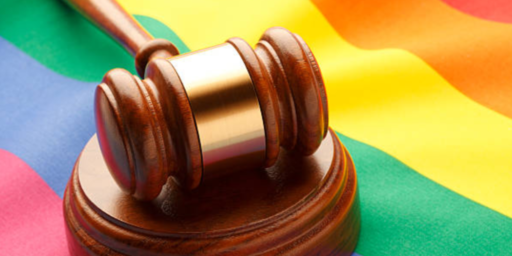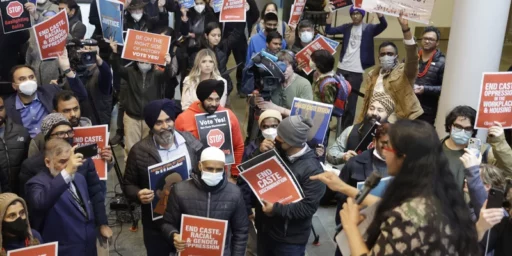Queer International Studies
Laura Sjoberg informs us that she is working to form a Lesbian, Gay, Bisexual, Transgendered, Queer, and Allies Caucus of the International Studies Association .
Laura Sjoberg informs us that she is working to form a Lesbian, Gay, Bisexual, Transgendered, Queer, and Allies Caucus of the International Studies Association (the premier organization of academic IR scholars) in order to:
A. To promote fair and equal treatment of members of the Lesbian, Gay, Transgendered, Bisexual, and Queer and Allies (hereafter LGBTQA) community in the International Studies Association (hereafter ISA) and in the profession of international studies, in areas including but not limited to graduate school admission, financial assistance in schools, employment, tenure, and promotion.
B. To combat discrimination against and provide support for LGBTQA faculty, student, and professional members of the International Studies Association.
C. To encourage the application of the skills of scholars and students of international studies to combat discrimination on the basis of sexual orientation.
D. To promote the recruitment of new members to the Caucus specifically and ISA generally.
Leaving aside that the last of the four goals amounts to a self-licking ice cream cone (not that there’s anything wrong with that) how needed are these? Is there really rampant discrimination on the basis of sex in the academy these days? Homosexuality is mainstream in our broader society at this point, much less the relatively liberal halls of academe.
Do LGTBQ types face discrimination in financial aid or grad school admissions? If so, how? That is, how would the bureaucratic offices who make these decisions even know that the people were LGTBQ? (One presumes, irrespective of the answer, that Allies are safe in this regard.)
I suppose that a man showing up for a job interview wearing lipstick and a dress might still be poorly received in many departments across the land. But so might a man showing up with a mustache or blue jeans or a too-nice suit.
Beyond this, what has any of this to do with ISA? It was “was founded in 1959 to promote research and education in international affairs.” Its current purpose is still along those lines:
I. Provide opportunities for communications among educators, researchers, and practitioners in order to continually share intellectual interests and meet the challenges of a changing global environment
II. Develop contacts among specialists from all parts of the world in order to facilitate scientific and cultural change
III. Provide channels of communication between academics and policy makers to promote a successful link between the production of knowledge and its utilization
IV. Improve the teaching and dissemination of ideas, concepts, methods, and information in the field of International Studies
Rather than hijacking a purely scholarly organization with grievance issues, why not form a caucus within, say, the American Association of University Professors?
One possible explanation: Sjobert is also chair of ISA’s Feminist Theory and Gender Studies section. In April, she expressed concern that some LGTBQ members of ISA might chose not to attend the 2010 annual meeting in New Orleans on the grounds that “there is a substantial risk of a lack of equal protection of the laws in the most dire possible situations, including but not limited to critical medical emergencies.” Apparently, this concern was not heeded and the meeting’s still on.
But, if LGTBQ activism can already take place (albeit, not successfully in this case) within the context of an existing organized section, why the need for a caucus?





It seems these people aren’t really looking for equal rights or protection, but rather special rights and protection.
Exactly which “special rights” are you referring to?
First of all, why do you care that some members of the ISA are forming a caucus? You need 50 members to sign a petition and get approval from the Governing Council to be recognized, as I understand it. If the organizers can get enough support, that shows there’s some demand. I personally think the Scientific Studies of International Processes section is crap, but if members want to join, more power to them.
Secondly, the sections/caucuses are self-governing and self-financing. Members pay extra dues that go explicitly to their sections so there is no undue burden on the organization.
Thirdly, it is wrong to equate “Feminist Theory and Gender Studies” with LGBTQ. They deal with different things. Sure there is some overlap, but there is overlap on many of the current ISA sections–e.g. Human Rights & International Ethics.
Exactly which “special rights” are you referring to?
“”””””””””””””””””””
How about the right to persecute those who disagree with you?
How about 1/3 more punishment for the same crime against a special rights group?
How about the legal right to curtail the free speech with the threat of imprisonment, just to protect the sensitivities of special rights groups?
Equal is equal…. Well to quote Orwell…
“All animals are equal but some animals are more equal than others”
If by “disagree with you”, you mean “think you are an abomination and should rot in jail for enjoying the same sexual rights as everyone else, and also deny them the right to marriage, adoption, and about a thousand other federal privileges”, then you might have an argument. But I guess it really depends on what you mean by persecution. If you mean ridicule those people as being hateful and bigoted, then sure. I don’t think anyone in the LGBT community wants someone jailed over their opinions, no matter how hateful they are.
Umm, what? Again, I don’t know of anyone who supports jailing people for expressing anti-gay statements.
This is the only one I’ll give you. I think hate-crime legislation is awful and an affront to our legal system.
This sums up modern academia. It’s all about them instead of their students. Pompous narcissists.
I agree exactly with Ben’s arguments.
According to the ISA they are there to help in exchange of ideas and research. I understand the use of premises but it sound more like they have conclusions and any data they collect will be to support those conclusion. Another example of junk science and bias studies pun not intended.